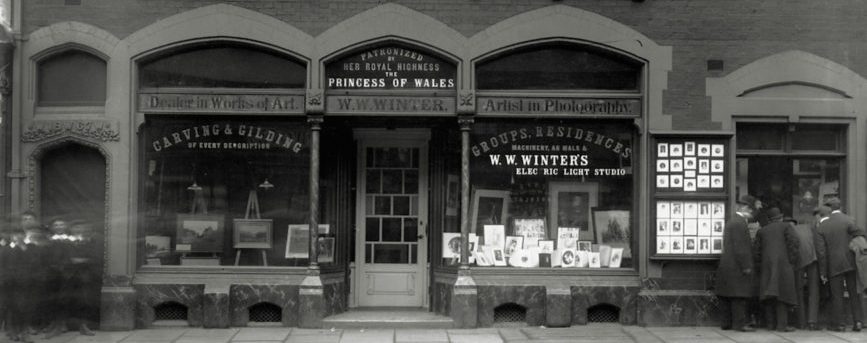This week Joanna continues to delve in to Winter’s public life:
This week I will write about two aspects of Walter Winter’s life which illustrate ‘Winter the man’. When doing family history I always try to find out about an ancestor other than a birth, marriage and death as it makes for a fuller and more interesting picture. One does have to be prepared to find skeletons in the cupboard however, and I appreciate that not everybody’s ancestor led as full a public life as Mr Winter!
Mr Winter – the freemason. The United Grand Lodge of England Freemason Membership Register available on the Ancestry website shows that Walter Winter was initiated into the Arboretum Lodge in 1869. The meeting place was at the Arboretum Hotel on Osmaston Road, Derby. Members included William Abney (photographer), Michael Thomas Bass MP., and Thomas Roe, friend and fellow council member. When the Masonic Hall was opened in Gower Street in 1876, Walter is listed as having ‘withdrawn’. There are glass plate negatives and prints of freemasons in their regalia in the Winter’s collection.
Mr Winter – the Volunteer. This information is the result of finding a newspaper article about Mr Winter’s attendance at a dinner given by members of the Litchurch Branch of the Working Men’s Association in 1878, and reported in the Derby Mercury.
Loyal toasts were duly honoured an ‘the Army, Navy and Reserve Forces’ was proposed by Mr W. W. Winter who as an old volunteer expressed his own willingness and that of many others who had passed through the ranks to shoulder the rifle again should the necessity arise.
His obituary in the Derby Daily Telegraph in 1925 mentions that Walter joined the Norfolk Volunteer Force as a young man in Great Yarmouth in 1859. The Volunteer Force was created in 1859 in response to the threat of war from Europe. It called for rifle and artillery corps to be set up. East Anglia and its ports were seen as being particularly vulnerable, and Great Yarmouth was fortified with twelve guns at the time. Volunteers were expected to attend twenty four times a year for drill and exercise. Over the years the Volunteer Force became increasingly integrated into the British Army and became the Territorial Force in 1908. Although not as a Volunteer, Walter Winter enrolled as a special constable at the time of the Fenian Rising in 1866-7, which sought to bring about the separation of Ireland from the United Kingdom.
Next time I will take a look at family matters.
